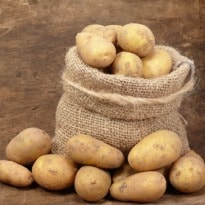An ingredient that could fight obesity could be sitting in your kitchen already! Researchers have found a simple potato extract may limit weight gain from a diet which is high in fat and refined carbohydrates. The benefits of the extract are due to its high concentration of polyphenols, a beneficial chemical component that's also found in fruits and vegetables, said the scientists from McGill University in Canada."We were astonished by the results," said Luis Agellon, one of the study's authors. "We thought this can't be right - in fact, we ran the experiment again using a different batch of extract prepared from potatoes grown in another season, just to be certain," Agellon explained.Popularly known for its carbohydrate content, the potato is also a source of polyphenols. According to this study, which appeared in the journal Molecular Nutrition & Food Research, potato extracts could be a solution for preventing both obesity and type 2 diabetes.
While carrying out the study, the researchers fed mice an obesity-inducing diet for 10 weeks. As a result, the mice that started out weighing on average 25 grams put on about 16 grams. But mice that consumed the same diet but with a potato extract gained much less weight - only seven more grams."The daily dose of extract comes from 30 potatoes, but of course we don't advise anyone to eat 30 potatoes a day," says Stan Kubow, principal author of the study, "as that would be an enormous number of calories." Instead, the researchers hope that in future the extract could be available as a dietary supplement or simply as a cooking ingredient. "Potatoes have the advantage of being cheap to produce, and they're already part of the basic diet in many countries," Kubow explains. "We chose a cultivated variety that is consumed in Canada and especially rich in polyphenols."Although humans and mice metabolize foods in similar ways, clinical trials are absolutely necessary to validate beneficial effects in humans. Besides, the optimal dose for men and women also needs to be determined, since their metabolisms differ. Right now the team is seeking partners to contribute to the funding of the trials and hope to patent the potato extract. With Inputs from IANS
While carrying out the study, the researchers fed mice an obesity-inducing diet for 10 weeks. As a result, the mice that started out weighing on average 25 grams put on about 16 grams. But mice that consumed the same diet but with a potato extract gained much less weight - only seven more grams."The daily dose of extract comes from 30 potatoes, but of course we don't advise anyone to eat 30 potatoes a day," says Stan Kubow, principal author of the study, "as that would be an enormous number of calories." Instead, the researchers hope that in future the extract could be available as a dietary supplement or simply as a cooking ingredient. "Potatoes have the advantage of being cheap to produce, and they're already part of the basic diet in many countries," Kubow explains. "We chose a cultivated variety that is consumed in Canada and especially rich in polyphenols."Although humans and mice metabolize foods in similar ways, clinical trials are absolutely necessary to validate beneficial effects in humans. Besides, the optimal dose for men and women also needs to be determined, since their metabolisms differ. Right now the team is seeking partners to contribute to the funding of the trials and hope to patent the potato extract. With Inputs from IANS
Advertisement
For the latest food news, health tips and recipes, like us on Facebook or follow us on Twitter and YouTube.
Tags:







